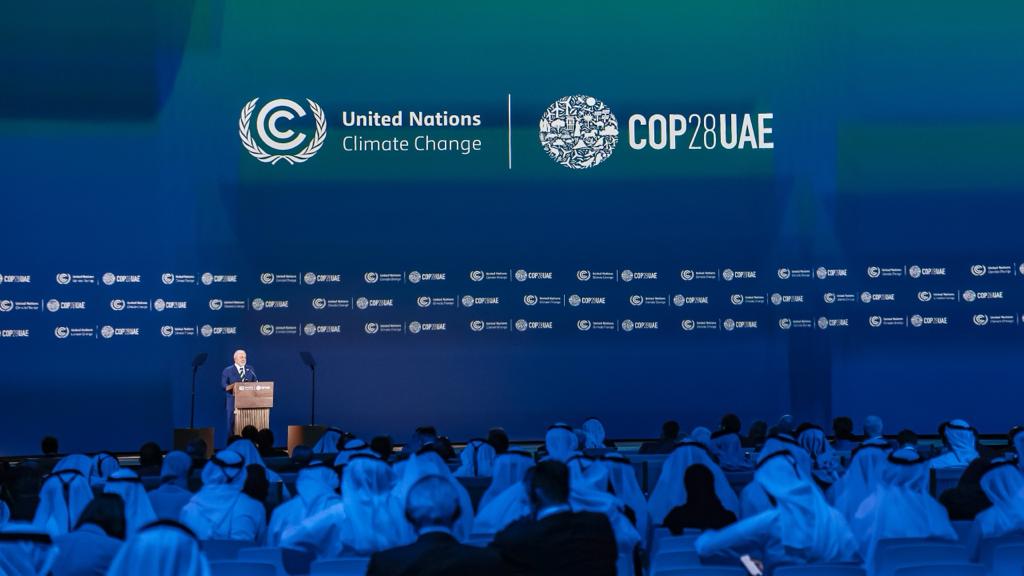Speech by President Lula at the opening session of the COP28 Presidency

- Photo: Ricardo Stuckert/PR
An African woman, Kenyan Nobel Peace Prize winner Wangari Maathai, summed up humanity's dilemma in its relationship with nature well.
She said: "The generation that destroys the environment is not the generation that pays the price."
The Intergovernmental Panel on Climate Change has warned that we only have until the end of this decade to prevent global temperatures from rising more than one and a half degrees above pre-industrial levels.
The year of 2023 is already the hottest year in 125,000 years.
Humanity is suffering from increasingly extreme and frequent droughts, floods and heatwaves.
In the north of Brazil, the Amazon is suffering one of the most tragic droughts in its history. In the South, storms and cyclones leave an unprecedented trail of destruction and death.
Science and reality show us that this time the bill has arrived earlier.
The planet is no longer waiting to bill the next generation.
The planet is fed up with unfulfilled climate agreements.
Of neglected carbon emission reduction targets.
Financial aid to poor countries that does not arrive.
Of eloquent and empty speeches.
We need concrete action.
How many world leaders are really committed to saving the planet?
Last year alone, the world spent more than US$2 trillion and 224 million dollars on weapons. This amount could be invested in fighting hunger and tackling climate change.
How many tons of carbon are emitted by the missiles that cross the sky and fall on innocent civilians, especially hungry children and women?
The bill for climate change is not the same for everyone. And it has come first for the poorest populations.
The richest 1% of the planet emits the same amount of carbon as 66% of the world's population.
Rural workers, whose subsistence crops have been devastated by drought and who can no longer feed their families.
Residents of the outskirts of big cities, who lose what little they have when the flood sweeps away everything: houses, furniture, pets and their own children.
The injustice that penalizes the younger generations is just one of the faces of the inequalities that afflict us.
The world has naturalized unacceptable disparities in income, gender and race.
Climate change cannot be tackled without tackling inequalities.
Those who suffer from hunger are trapped in the pain of the present. And they become incapable of thinking about tomorrow.
Reducing socio-economic vulnerabilities means building resilience in the face of extreme events.
It also means being able to redirect efforts towards the fight against global warming.
In 2009, when I took part in COP15 in Copenhagen, the architecture of the Climate Convention was on the verge of collapse.
Negotiations failed and it took a huge effort to regain confidence and reach the Paris Agreement in 2015.
As I return to the presidency of Brazil, I see that we are in a similar situation today.
Failure to fulfill the commitments made is eroding the credibility of the regime.
We need to restore our belief in multilateralism.
It is inexplicable that the UN, despite its efforts, is incapable of maintaining peace, simply because some of its members profit from war.
It is regrettable that agreements such as the Kyoto Protocol (1997) or the Paris Accords (2015) are not implemented.
Governments cannot shirk their responsibilities.
No country will solve its problems alone. We are all obliged to act together beyond our borders.
Brazil is willing to lead by example.
We have adjusted our climate targets, which are now more ambitious than those of many developed countries.
We have drastically reduced deforestation in the Amazon and will bring it to zero by 2030.
We have formulated an ecological transformation plan to promote green industrialization, low-carbon agriculture and the bioeconomy.
We have forged a common vision with the Amazon countries and created bridges with other countries with tropical forests.
The world is already convinced of the potential of renewable energies.
It is time to tackle the debate about the slow pace of the planet's decarbonization and work towards an economy less dependent on fossil fuels.
We must do so urgently and fairly.
Let us work constructively, with all countries, to pave the way between this COP28 and COP30, which we will host in the heart of the Amazon.
There are not two planets on Earth. We are a single species, called Humanity.
We all want to make the world capable of welcoming all its inhabitants with dignity - and not just a privileged minority.
As Pope Francis invites us in his Encyclical "All Brothers", we need to live together in fraternity.
Thank you very much.